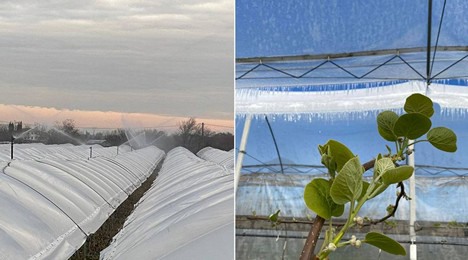After the frost of mid-March 2021, the frost of the past week caused serious damage to the fruit-growing potential of northern Italy. Stefano Lugli, experimenter at the University of Modena and Reggio and breeder of some of the most renowned cherry varieties, illustrates his point of view.
"I believe the time has come to think about producing fruit in a protected environment to avoid bad surprises. We started years ago to deal with hail problems, then moved on to protections against rain and parasites. We need to also include protection systems against late frost, as it is increasingly common."
Polytunnels against the rain, insects, hailstones and frost should be used for cherries, kiwifruit, peaches and apricots in the north as well. Not so much to hasten harvesting, but to safeguard the crops.
 Irrigation over nets Christian Schwarzer (Treviso)
Irrigation over nets Christian Schwarzer (Treviso)
Lugli talked about two anti-frost protection systems recently employed for two orchards in northern Italy. In the first case, a special film protects against external agents and irrigation under the canopy helps maintaining the temperature somewhat higher (2.5°C) than in the open fields. In the second case, irrigation is carried out above the canopy and outside the film so as to create a sort of 'igloo' protecting the plants (6-5°C difference).
It is a significant investment, but European and regional resources should go in this direction. "Actually, the insurance system envisages for the State to pay most of the premium to Companies, but there is no return for society and the local economy if not for growers and, partly, for companies. If those funds were used to finance investments to physically protect the fruit, we could provide work to the entire chain with a considerable economic return for the State. Doing things through insurance companies means throwing away money with regards to obtaining the produce, maintaining clients, guaranteeing work to operators, logistics and packagers, i.e. to the entire chain," explains a producer.
